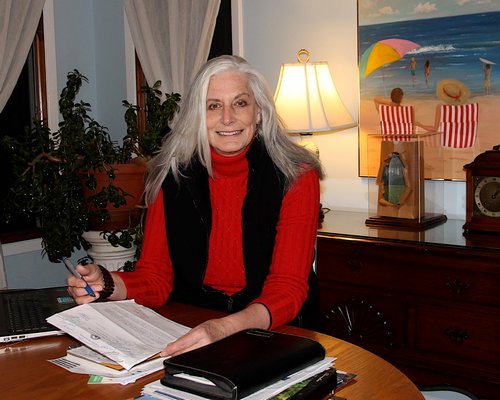
An auditor for the Suffolk County Comptroller said that the staff has not, in fact, used the rental registries from Southampton or East Hampton towns to identify residents who the office deems are responsible for paying taxes on income from lodging rentals
The auditor said the office has not requested to view the lists from any of the eight townships in the county that require landlords to register their rental properties.
Landlords who the county has approached about delinquency on 3-percent lodging tax have largely been identified through a variety of resources in the public domain, including advertisements on various rental listing websites, the auditor said.
The Suffolk County comptroller’s office has used the rental registries of Southampton and East Hampton towns to identify residential property owners it says should be paying the county’s hotel/motel tax on revenues from seasonal rentals of less than 30 days.
County Comptroller John M. Kennedy Jr. said in an interview this week that his office has recouped as much as $25,000 in owed hotel/motel taxes from the owners of East End rental properties, as part of a regionwide effort to identify properties that are effectively being used as commercial ventures and should be looked at on par with known businesses like B&Bs and motels.
“The term is ‘hotel/motel tax,’ but the statute is any kind of vacation rental or vacation lodging: bungalows, residences that are utilized primarily for rental purposes,” Mr. Kennedy said on Tuesday. “It’s fairly broad legislation, and it’s fairly broad as far as what triggers the obligation to remit the 3-percent lodging tax. It’s not the type of structure as much as the function.”
Mr. Kennedy had alluded to his intention to start looking at some residential rentals more than a year ago when he announced that his office was setting out to identify more lodging businesses that had been delinquent on hotel/motel taxes.
Since that time, the comptroller said, the office has doubled the number of listed lodging businesses on its tax rolls, brought in $700,000 in owed tax revenues, and increased the annual levy by, he estimated, some $500,000 annually, to something over $10 million.
When his office was embarking on the effort, Mr. Kennedy specifically nodded to the possibility of seeking out residential property owners for taxation on rental income, and even alluded to the possibility of checking rental registries to identify them.
The point was raised during the then-ongoing debate over whether East Hampton Town should create the list of renters’ names and addresses—and doubters said that knowing the list might be used in such ways would make rental landlords less likely to sign up.
One of the most vocal critics of the law during the drafting debates was Springs resident Lynne Scanlon, and last week Ms. Scanlon got a letter from an auditor in Mr. Kennedy’s office saying that she may owe hotel/motel taxes.
“I don’t know how or why they singled me out—I haven’t heard of anyone else that got one of these letters,” Ms. Scanlon said. “I play by the rules … I declare every dime.”
Ms. Scanlon acknowledged that she had used Airbnb to rent her house for some time, typically on a weekly basis in summertime, and typically for a matter of only a week at a time. This summer, after the adoption of the rental registry law, she adhered closely to the town’s rental regulations, which limit a landlord to two rentals of less than two weeks. She said the house is her primary residence, though she owns it with her two brothers, and that the rental income in the summer is to help with property taxes—but, she said, it should not be compared to a B&B.
“I’m semi-retired, and it’s nice to pick up a little extra money,” she said. “But this is my home, not a B&B. I don’t feed anybody. They’re not in my kitchen. It’s one room—not a hotel.”
East Hampton Town Councilwoman Sylvia Overby said that she was instinctively concerned to hear the county comptroller using the rental registry lists to track down homeowners, especially if the comptroller starts expecting taxes from those locals who rent out their primary residence for a few weeks in the summer season to help make ends meet.
“I would not want to see the registry used in that way, it puts us in an awkward situation,” Ms. Overby said. “The intent of the registry was to maintain the quality of life in our neighborhoods.”
Mr. Kennedy said he could not discuss individual cases like Ms. Scanlon’s, but said his office has used a variety of means to identify what it sees as potential tax scofflaws, including the rental registries but also online listing sites—a tactic that town code enforcement officers have used for years to ferret out illegal group rentals and short-term party house rentals.
One homeowner, he said, was the owner of a Dune Road “McMansion” in Southampton Town who admitted to having bought the house purely as an investment and had earned more than $600,000 income from it in the last three summers. She was levied some $25,000 in hotel/motel tax, the comptroller said.
The comptroller was vague about how state statute and county code specify the sort of circumstances that constitute a commercial lodging enterprise that can be taxed, other than to say that the laws are broad and afford him wide latitude to tax guesthouses being rented for periods of less than 30 days. But, he noted, staffing realities mean that the office will be unlikely to reach for the edges of its authority in seeking out rental taxes.
“I’m not interested in chasing the individuals who are limited renters,” he said. “We have a finite resource, and my objective is to maximize the return for the time my folks spend out there.”